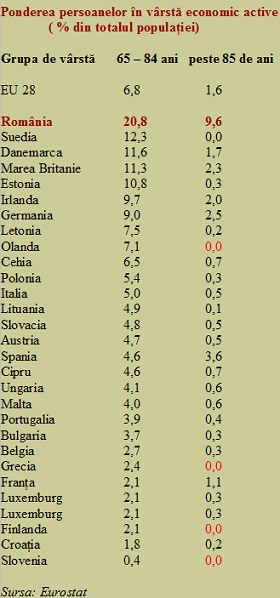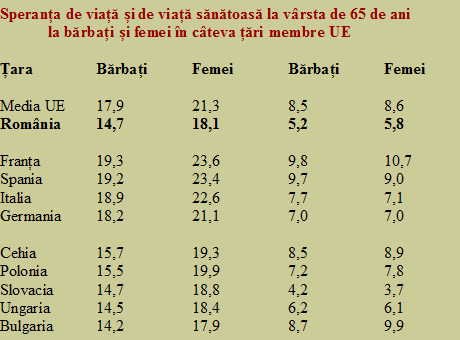 Romania leads by far the European top of older people who are economically active, far from the Nordic and neighboring countries, according to Eurostat data.
Romania leads by far the European top of older people who are economically active, far from the Nordic and neighboring countries, according to Eurostat data.
With 20.8% of the people between 65 and 84 years of age and 9.6% of people in the age group over 85, we are placed at a level about three times the EU average, in the first category and six times the EU average, in the second one.
 Neither the relatively low standard of living (see the situation in Sweden, Denmark and Britain, countries with developed economies) nor the legacy of the former socialist regime (see the positioning in the second half of the ranking for Bulgaria, Hungary, as well as below the EU average for the Czech Republic or Poland) explain this behavior.
Neither the relatively low standard of living (see the situation in Sweden, Denmark and Britain, countries with developed economies) nor the legacy of the former socialist regime (see the positioning in the second half of the ranking for Bulgaria, Hungary, as well as below the EU average for the Czech Republic or Poland) explain this behavior.
The relatively high rural population whose source of livelihood comes from what they obtain in their own household is rather at the root of this situation hard to predict; especially that the life expectancy of people over 65, although similar to the former socialist countries (despite our lower life expectancy at birth) is still far from the EU average and the developed countries.
*
- The share of economically active older people (% of population)
- Age category
*
Expectancy for healthy life
Although expectancy for healthy life is relatively low, both as compared to the developed countries and the former socialist states, healthy or not, Romanians consider in a much larger proportion than other peoples that they must remain active until an old age or even very advanced age, on the principle of being economically useful as long as they live.
 Life and healthy life expectancy at the age of 65 for men and women in some EU countries
Life and healthy life expectancy at the age of 65 for men and women in some EU countries
Country – Men – Women – Men – Women
EU Average
If we would put together this information centralized and certified by Eurostat in comparable conditions, Romanians who reach the age of retirement, although they live somewhat less than elderly people from the former socialist countries (who at their turn have less years of life than those from developed countries) and have poorer health, worked the most.
These data will inevitably change as convergence with the European habits will inevitably happen. It is expected just in the near future for the proportion of the economically self-sustaining older people to significantly decrease. This trend correlated with the lifetime increase and the absence of a significant improvement of the healthcare system will put additional pressure on the public budget.
This is an example talking about the need to prepare and rapidly implement a national strategy, taking into account the foreseeable change of very important economic and social parameters. The strategy will require a harmonized political decision regarding the allocation and redistribution of some additional resources, regardless of who will temporarily find themselves in power.









